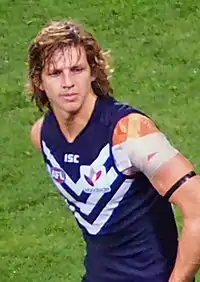The Brownlow Medal (formally the Charles Brownlow Trophy) is an individual award given to the player judged fairest and best in the Australian Football League (AFL) during the regular season. Determined by votes cast by the officiating umpires after each game, it is considered the highest honour for individual players in the AFL.[1][2]
The medal has been awarded every year since 1924, with the exception of an intermission from 1942–1945 due to World War II. As of 2023, the Brownlow Medal has been awarded 110 times to 90 different players in 95 medal counts.
Winners by season

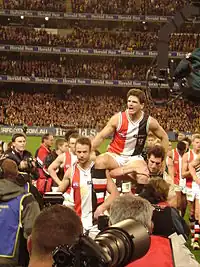
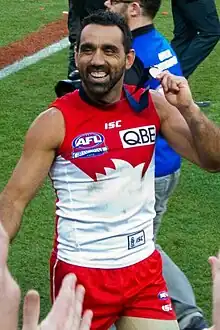

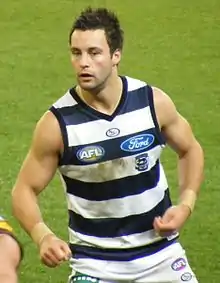
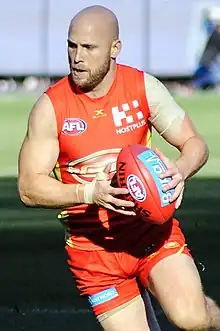
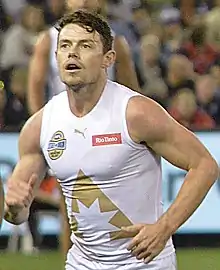
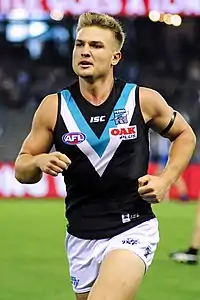
Notes:
- 1 2 3 4 5 6 7 8 Medal was awarded retrospectively, as a countback rule was applied until 1980.
- ↑ No winner was declared in 1940: Des Fothergill and Herbie Matthews being recognised retrospectively as joint winners in 1989 after having initially received replica medals.
- 1 2 The voting system in 1976 and 1977 had both field umpires awarding votes, resulting in higher vote tallies than in other years.
- 1 2 Medal was awarded retrospectively: Jobe Watson of Essendon was the original winner, but was ruled ineligible after found guilty of a doping violation.[3]
As a mark of respect to soldiers fighting overseas in World War II, the medal was not awarded during 1942–1945.
Ineligible players who polled the most votes
A player guilty of an offence deemed worthy of a suspension by the AFL's disciplinary tribunal for serious on-field offences is ineligible to win the Brownlow Medal. Suspended players have tallied the highest number of votes for the award on three occasions. In the third of those cases, Jobe Watson, who won in 2012, was later found guilty of breaching WADA's anti-doping code in the 2012 season, and was retrospectively ruled ineligible by the AFL Commission in November 2016.[4]
| Player | Team | Year | Votes | Outcome |
|---|---|---|---|---|
| Corey McKernan | North Melbourne | 1996 | 21 | Suspended; would have been joint winner with Hird and Voss. |
| Chris Grant | Western Bulldogs | 1997 | 27 | Suspended; would have won outright, beating Harvey by one vote. |
| Jobe Watson | Essendon | 2012 | 30 | Awarded the medal in 2012, beating Mitchell and Cotchin by four votes. In 2016 he was retrospectively ruled ineligible because of his involvement in the Essendon supplements saga. |
Multiple winners

The following players have won the Brownlow Medal multiple times.
| Medals | Player | Team | Seasons |
|---|---|---|---|
| 3 | Haydn Bunton Sr. | Fitzroy | 1931, 1932, 1935 |
| Dick Reynolds | Essendon | 1934, 1937, 1938 | |
| Bob Skilton | South Melbourne | 1959, 1963, 1968 | |
| Ian Stewart | St Kilda / Richmond | 1965, 1966, 1971 | |
| 2 | Ivor Warne-Smith | Melbourne | 1926, 1928 |
| Bill Hutchison | Essendon | 1952, 1953 | |
| Roy Wright | Richmond | 1952, 1954 | |
| Keith Greig | North Melbourne | 1973, 1974 | |
| Peter Moore | Collingwood / Melbourne | 1979, 1984 | |
| Greg Williams | Sydney / Carlton | 1986, 1994 | |
| Robert Harvey | St Kilda | 1997, 1998 | |
| Adam Goodes | Sydney | 2003, 2006 | |
| Chris Judd | West Coast / Carlton | 2004, 2010 | |
| Gary Ablett Jr. | Geelong / Gold Coast | 2009, 2013 | |
| Nat Fyfe | Fremantle | 2015, 2019 | |
| Lachie Neale | Brisbane Lions | 2020, 2023 |
Voting systems
Since 1924, the voting system for the Brownlow has changed three times.
| 1924–1930 | One vote per game |
| 1931–1975, 1978–present | Six votes per game: 3 votes, 2 votes, and 1 vote |
| 1976–1977 | Twelve votes per game: 3 votes, 2 votes, and 1 vote from each of the two field umpires |
From 1930 to 1980, a countback system was used to determine the winner in the event of a tie. In 1930, Judkins was awarded the medal as he had played in the fewest games.
From 1931 to 1980, with the introduction of 3–2–1 voting, the winner was the player with the most three-vote games.[2] In 1980, the countback system was removed, and in the event of a tie, players have been considered joint winners.[2] In 1989, the then VFL awarded retrospective medals to all players who had tied but lost on countback prior to 1980.[5]
Brownlow wins by clubs
| Team | Wins | Years Won |
|---|---|---|
| South Melbourne/Sydney | 14 | 1940, 1949, 1955, 1959, 1963, 1968, |
| Footscray/Western Bulldogs | 10 | 1930, 1941, 1956, 1960, 1975, 1980, |
| St Kilda | 10 | 1925, 1957, 1958, 1959, 1965, 1966, |
| Collingwood | 9 | 1927, 1929, 1930, 1939, 1940, 1972 |
| Fitzroy | 8 | 1931, 1932, 1933, 1935, 1936, 1950 |
| Essendon | 8 | 1934, 1937, 1938, 1952, 1953, 1976 |
| Richmond | 7 | 1930, 1948, 1952, 1954, 1971, 2012, |
| Melbourne | 7 | 1926, 1928, 1946, 1982, 1984, 1991, |
| Geelong | 7 | 1924, 1951, 1962, 1989, 2007, 2009, |
| Hawthorn | 6 | 1949, 1986, 1987, 1999, 2012, 2018 |
| Carlton | 6 | 1947, 1961, 1964, 1994, 2010, 2022 |
| North Melbourne | 5 | 1965, 1973, 1974, 1978, 1983 |
| Brisbane Lions | 4 | 2001, 2002, 2020, 2023 |
| West Coast | 3 | 2004, 2005, 2014 |
| Fremantle | 2 | 2015, 2019 |
| Gold Coast | 1 | 2013 |
| Brisbane Bears | 1 | 1996 |
| Adelaide | 1 | 2003 |
| Port Adelaide | 1 | 2021 |
| GWS | 0 | |
| University | 0 |
See also
Notes
- ↑ Sean Miller. "What makes the Brownlow so special?". Premier Media Group. Retrieved 15 November 2008.
- 1 2 3 "Brownlow Medal – AFL Brownlow Medal". Australian Football League. Archived from the original on 12 June 2008. Retrieved 15 November 2008.
- ↑ "Sam Mitchell, Trent Cotchin accept 2012 Brownlow Medal with 'mixed emotions'". ABC News. 15 November 2016. Retrieved 20 August 2018.
- ↑ "AFL Commission statement on 2012 Brownlow Medal". Australian Football League. 15 November 2016. Retrieved 15 November 2016.
- ↑ "1980–1989". AFL BigPond Network. 11 December 2006. Archived from the original on 16 July 2012. Retrieved 10 July 2011.
